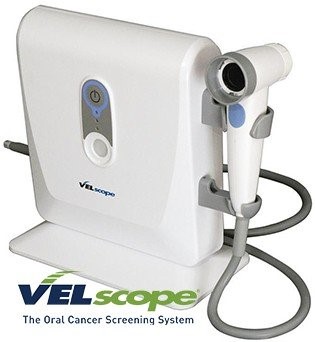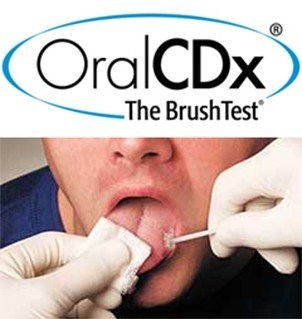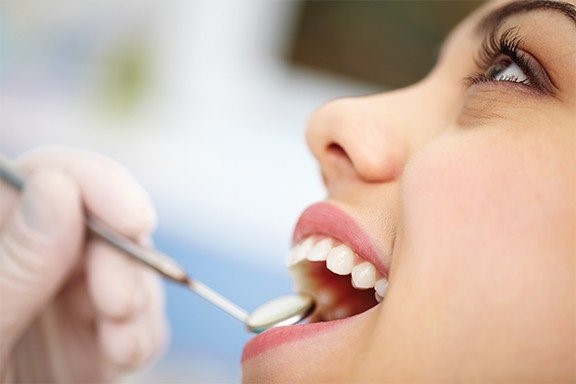The Risks and Realities of Oral Cancer
One American dies every hour from oral cancer, and the mortality rate has remained virtually unchanged for 40 years. Early detection is so important because it means a 90% cure rate. To help us ensure your complete oral health, we are pleased to provide highly effective oral cancer screenings using the newest FDA-approved oral cancer screening system, VELscope®. This tool uses a specially designed light that makes any suspicious tissue immediately and easily visible during your exam. This screening could literally save your life!
Additionally, certain types of the human papillomavirus (HPV), the virus commonly associated with cervical cancer, have been linked to mouth and throat cancer. HPV has caused an increase of cases in young, non-smoking individuals with low levels of alcohol consumption, a group that, until recently, had a low rate of oral cancer incidence. We test for HPV to help ensure any problems are detected early.

A Painless Way To Test for Oral Cancer
Have you ever seen red or white spots in your mouth and wondered if they were anything to worry about? Most of the time, they’re not, but the only way to tell is laboratory testing. Dr. Roca uses the OralCDx® Brush Test to check suspicious spots. The brush is quick and painless, collecting cells for testing. After we send the sample to the OralCDx lab, they’ll let us know if there’s anything of concern. This will help us help you address a concern early, removing any dangerous cells before they can do you harm.

Knowing the Signs of Oral Cancer
Oral sores are the most common and noticeable symptoms of oral cancer. These lesions may be white, red, or a mix of the two colors. Everyone develops small canker or cold sores from time to time, and these are not typically cause for concern. However, if you suffer from chronic mouth sores, you should schedule an appointment with Dr. Roca as soon as possible.
Other symptoms of oral cancer include:
- A lump on your neck, gums, jaw, cheek, or tongue
- Persistent sore throat
- Chronic bad breath
- Loose teeth
- Poorly fitting dentures
- Jaw stiffness or discomfort
- Tongue stiffness
- Difficulty swallowing or chewing
- Feeling like there is something stuck in your throat
What To Expect During a Cancer Screening
If you have noticed any of the symptoms listed above, you should schedule an appointment with Arlington Smile Center to check for oral cancer. Dr. Roca will conduct a thorough visual exam of your mouth. She will look for sores and any tissue discoloration. Should she notice any irregularities, she will recommend a biopsy. She will send the sample of tissue to the lab, where experienced lab techs will determine if the tissue sample is cancerous. Often, these sores turn out to be benign, and Dr. Roca can recommend appropriate treatment. If you are diagnosed with cancer, she will assist you with referrals for specialist treatment. Then, she will provide compassionate care in conjunction with the rest of your medical team.
Do You Need a Cancer Screening?
All adults should undergo oral cancer screenings at least twice a year. However, if you are at a high risk for the disease, we suggest more frequent appointments. Tobacco use is the number one risk factor. If you use cigarettes, cigars, pipes, snuff or even e-cigarettes, you are much more likely to develop oral cancer. Your risks increase in proportion to the frequency and duration with which you use these products. Other risk factors include:
- A personal or family history of cancer
- HPV (human papillomavirus)
- A history of alcoholism
Benefits of Early Detection
- Found early, oral cancer’s five-year survival rate is 80% to 85%
- Found late, oral cancer’s five-year survival rate is only about 50%.

Oral Squamous Cell Carcinomas (OSCC)
OSCC make up over 90% of all oral cancers. Because of its appearance, OSCC is difficult to differentiate from other, relatively benign lesions of the oral cavity. Early OSCC and potentially malignant lesions can appear as a white patch (leukoplakia), as a reddened area (erythroplakia) or as a red and white mucosal change under standard white light examination (erythroleukoplakia). These cellular changes are often non-detectable to the human eye, even with magnification eyewear, under standard lighting conditions. Often, when the lesion becomes visible, it has advanced to invasive stages. The high mortality rate is directly related to the lack of early detection of potentially malignant lesions. When diagnosis and treatment are performed at or before a Stage I carcinoma level, the survival rate is 80%-to-85%.
The HPV Connection
In recent years, younger males as well as females have accounted for an increasing percentage of oral cancer victims. The reason, which has been documented by numerous studies, is now known to be a link between oral cancer and the sexually transmitted human papillomavirus, or HPV. One type of HPV — the HPV-16 strain — is the leading cause of oropharyngeal cancer, the fastest-growing type of head and neck cancer. HPV is also the leading cause of cervical cancer, and it can cause vaginal, penile, and vulvar cancer as well as genital warts. About 20 million Americans currently have an HPV infection. According to the CDC, an estimated 7,080 men and 14,720 women develop cancers associated with HPV types 16 and 18 every year. An estimated 80% of anal cancers, 65% of vaginal cancers, 60% of oropharyngeal cancers, 50% of vulvar cancers, 35% of penile cancers and nearly all cervical cancers are HPV-related. HPV-related disease costs an estimated $8 billion annually.
Early Screening May Affect Mortality Rates
The impact of HPV is one reason that, despite the decline in tobacco usage, oral cancer is one of the few cancers whose incidence rate has not improved in the past 50 years. The cancers that have seen a major decline in the mortality rate have included colon, cervical and prostate cancer, and the primary reason is increased screening and earlier detection. We feel there is every reason to believe that increased screening and earlier detection will have the same effect on the mortality rate of oral cancer.
Schedule an Appointment Today
Do not let serious health conditions catch you unaware. You may contact us to schedule an oral cancer screening. If it has been more than six months since you had an oral health examination, you are overdue for preventive care that includes an oral cancer screening.
Don’t delay! Call us now at 703-237-7622 to schedule your next preventative visit, or to ask us any questions about your routine care.
